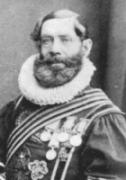|
|
||||||||||||||||||||||||
 |
Featured person
Recently added |
Cyril Ehrlich (1925 - 2004): |
||||||||||||||||||||||
Professor Cyril Ehrlich occupied the Chair of Economic and Social History at Queen's University, Belfast; he wrote groundbreaking books on East African economies, the piano, and the music profession, as well as being an inspiring and dedicated pedagogue and proficient administrator.
A Londoner of eastern European Jewish background, he attended a variety of schools, as his parents, tailors, moved around England for trade reasons, though this peripatetic education did not prevent him gaining a place at the London School of Economics, which he entered in 1947 after a spell in the RAF Education Corps, where he taught musical appreciation. His parents were keen musicians and avid collectors of recorded music; also Cyril Ehrlich taught himself to play the piano. After graduating in economic history, he remained in London before taking up a post at Makerere College, Uganda in 1952. During his nine years there he wrote his PhD thesis on "The Marketing of Cotton in Uganda 1900-1950" in which he demonstrated that however well-intentioned, efforts by colonial government to protect poor farmers in fact had the opposite effect to that intended. He also published a book, The Uganda Company Limited: the first 50 years. These works were pioneering in terms of subject and source material, giving economics a cultural context, and when later the editors of The Oxford History Of East Africa wanted a broad yet expert contribution on the Ugandan economy, it was to Ehrlich they turned.
In 1961 he was appointed Lecturer at Queen's University, Belfast, where he would remain for a quarter of a century, rising eventually to become Professor of Economic and Social History and Dean of that Faculty. It was while he was in Belfast that he researched and wrote The Piano: A History, which was published in 1976. Another pioneering study, it combined a music-lover's enthusiasm and scholarship with an economic historian's thorough grasp of economic indicators, company records and social trends. "The early history of the piano is familiar, or highly accessible" he began; modestly, as the Musical Times described what followed as "distilling an enormous amount of previously undigested material" into what the Journal of Economic History opined was a "formidable accomplishment". Critical acclaim also appeared across the Atlantic in the New Yorker.
Unsurprisingly, Ehrlich was a well-known figure in musical circles in Belfast; alongside his industrious existence he was a sympathetic and hospitable host, his music room, with grand piano, clavichord and extensive record collection merely other attractions to his home. His wife, Felicity, was always at hand with her inestimable courtesy, charm, and chocolate cake. It was accurate, not clichéd, to describe his knowledge of music in general, not merely the piano repertoire, as encyclopaedic, partly disguised as it was by his obvious enthusiasm, encompassing the nineteenth-century Teutonic edifices of Wagner (on which he ran a study group) as well as the Broadway musical theatre of Stephen Sondheim. Visitors would often depart with armfuls of discs, subject to close questioning about the state of the borrower's stylus, as well books.
On leaving Belfast he relocated to Headington, Oxford, within easy reach of London, where he carried out the research for two later, major books, Harmonious Alliance: A History Of The Performing Rights Society (1989; commissioned by that body) and First Philharmonic: A History Of The Royal Philharmonic Society (1995). The Piano: A History was republished by Oxford University Press in 1990 in an edition revised and updated by its author. He was a contributor the Musical Times, often as a record reviewer, and as historian of the piano to the distinguished New Grove Dictionary of Music and Musicians. Always energetic, and highly sought-after, Cyril Ehrlich was a principal convenor of the seminar series, "Music in Britain: A Social History", at the Institute of Historical Research, London University, where he was Visiting Professor of Music from 1995 to 1997; in 1998 he was appointed Visiting Professor at Goldsmiths College. As in Belfast, if more so, he was always welcoming at home especially to musicians and academics, and especially to younger ones, to whom he was always encouraging, ever a resource of advice of all kinds. He was ably supported in this by his wife, a former music librarian; their three children, all educated in Belfast, developed successful careers as musicians, one son as a violist in North America, his daughter as a violinist in England, his younger son an executant musician with an internaional career and appointed in 2006 Rector of the Felix Mendelssohn Hochschule für Musik und Theater Leipzig. Again the visitor, as ever musically, intellectually and gastronomically thoroughly entertained would often depart with armfuls of recordings, now in the format of compact disc, obviating any stylus-concerned enquiries.
Professor Ehrlich's 75th birthday was marked by the publication of a Festschrift, Music and British Culture 1785-1914, by Oxford University Press.
| Born: | 13 September 1925 |
| Died: | 29 May 2004 |
| Richard Froggatt |
| Acknowledgements: Wesley McCann |
| Bibliography: Obituaries: The Guardian; The Independent; The Times; The Piano: A History (London, Dent, 1976); personal knowledge |


Home | Our Policies | Plaques | Browse | Search | Sponsors | Links | Help | Contact
Privacy & Disclaimer | Cookie Policy | Site Map | Website Design By K-Point
© 2024 Ulster History Circle









